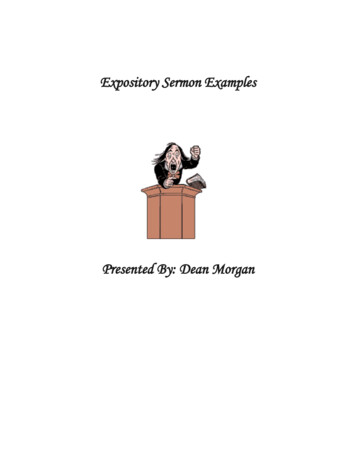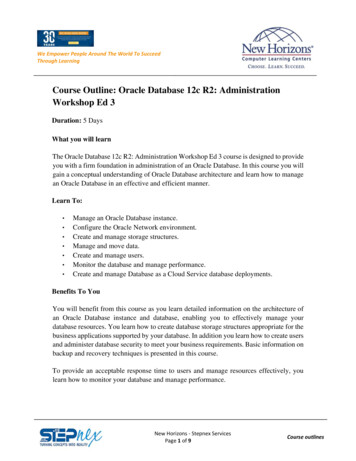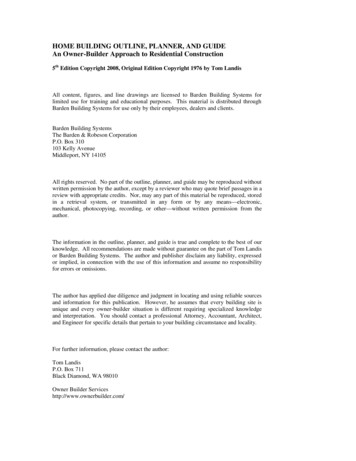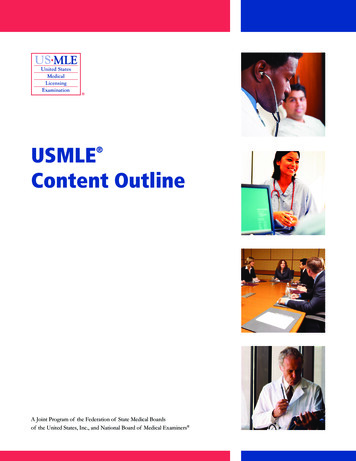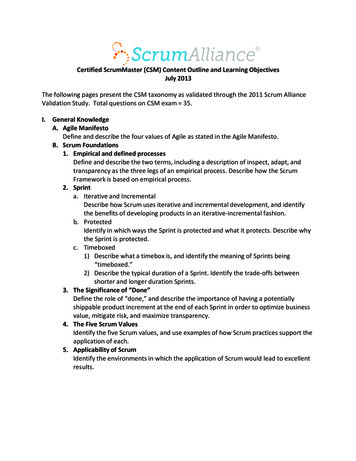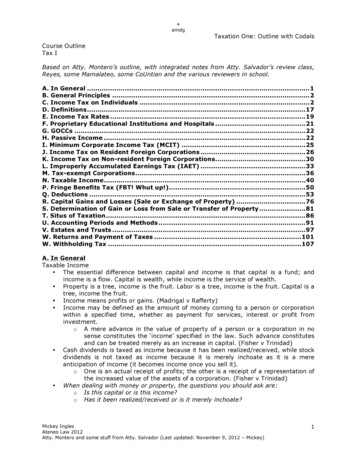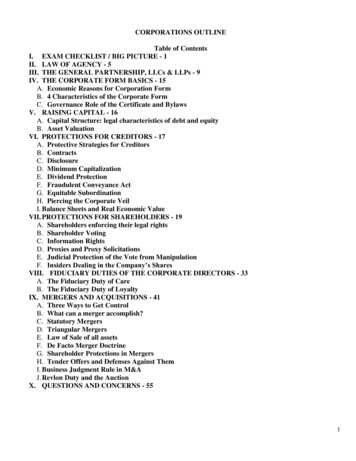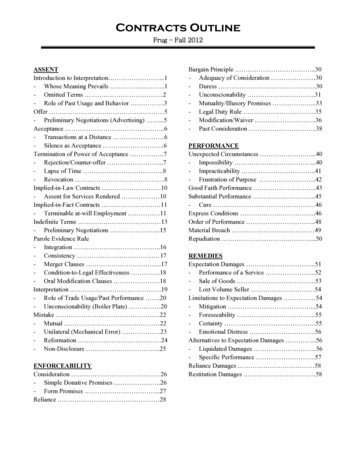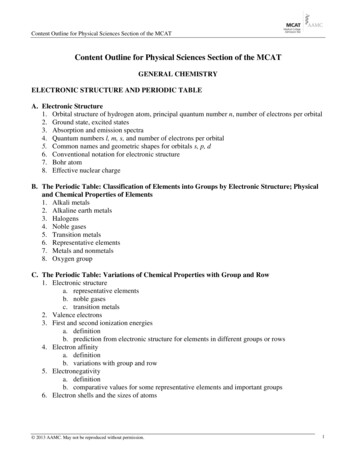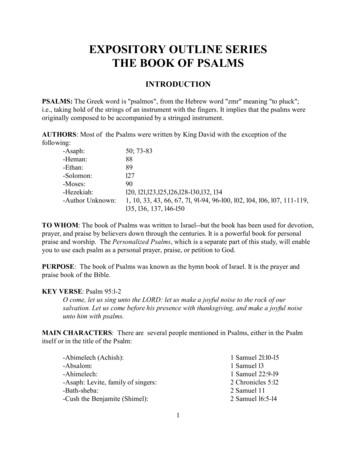
Transcription
EXPOSITORY OUTLINE SERIESTHE BOOK OF PSALMSINTRODUCTIONPSALMS: The Greek word is "psalmos", from the Hebrew word "zmr" meaning "to pluck";i.e., taking hold of the strings of an instrument with the fingers. It implies that the psalms wereoriginally composed to be accompanied by a stringed instrument.AUTHORS: Most of the Psalms were written by King David with the exception of thefollowing:-Asaph:50; iah:l20, l2l,l23,l25,l26,l28-l30,l32, l34-Author Unknown: 1, 10, 33, 43, 66, 67, 7l, 9l-94, 96-l00, l02, l04, l06, l07, 111-119,l35, l36, 137, l46-l50TO WHOM: The book of Psalms was written to Israel--but the book has been used for devotion,prayer, and praise by believers down through the centuries. It is a powerful book for personalpraise and worship. The Personalized Psalms, which is a separate part of this study, will enableyou to use each psalm as a personal prayer, praise, or petition to God.PURPOSE: The book of Psalms was known as the hymn book of Israel. It is the prayer andpraise book of the Bible.KEY VERSE: Psalm 95:l-2O come, let us sing unto the LORD: let us make a joyful noise to the rock of oursalvation. Let us come before his presence with thanksgiving, and make a joyful noiseunto him with psalms.MAIN CHARACTERS: There are several people mentioned in Psalms, either in the Psalmitself or in the title of the Psalm:-Abimelech (Achish):-Absalom:-Ahimelech:-Asaph: Levite, family of singers:-Bath-sheba:-Cush the Benjamite (Shimel):1 Samuel 2l:l0-l51 Samuel l31 Samuel 22:9-l92 Chronicles 5:l22 Samuel 112 Samuel l6:5-l41
-Doeg the Edomite:-Ethan the Ezrahite (A wise man in Solomon's time):-Heman the Ezrahite (Levite family of singers):-Jeduthun (Chief musician in the temple):-Korah (Levite, head of the temple musicians):-Nathan (Prophet of God):-Sons of Korah (Musical Levite family):-Ziphites:1 Samuel 22:9-231 Kings 4:3l2 Chronicles 5:l21 Chronicles l6:4l-421 Chronicles 6:222 Samuel l2:l-l41 Chronicles 6:221 Samuel 23:l9INSTRUMENTS MENTIONED IN PSALMS:-Alamoth:-Gittith:-Mahalath:-Mahalath Leannoth:-Sheminith:High-pitched harpsSimilar to the modern guitarFlutesSpecial flutes played in times of mourningA lyre or five stringed harpTYPES OF PSALMS:Psalms Of Instruction: The word "Maschil" in the title means these and other Psalms are to beused for instruction or teaching. (Psalms 32, 44, 52, and 78 are examples.)Ethical Psalms: These psalms teach moral principles. Example: Psalm 15.Psalms Of Praise And Adoration: In these Psalms God's greatness, mercy, love, and power arethe theme. (See Psalms 8, 29.)Psalms Of History: These recall historical events of the nation of Israel. (See Psalms 78, l05and l06.)Psalms Of Prayer And Supplication: Making requests of God. (An example is Psalm 86.)Psalms Of Thanksgiving: An example is Psalm l8.Imprecatory Psalms: The word "imprecatory" means cursing. These Psalms are not forpersonal revenge, nor is bad language used. As a prophet of God, the writer is simply speakingout against sin and the enemies of God. (Examples of these are Psalms 35, 55, 58, 59, 69, 83,l09, l37 and l40.) These Psalms can be applied spiritually against Satanic attacks, fleshly sinsand habits, and opposition to the Gospel. They should not be used against individuals. Believersshould not pray “curses” on people because it is the goodness of God that draws men torepentance, not curses.Confession Psalms: Examples are Psalms 6, 32, 38, 5l, l02, l30 and l43.2
Suffering Psalms: These psalms are examples of those suffering affliction. Example: Psalms102.Songs Of Ascent: These were possibly sung on pilgrims on the way to Jerusalem to observe thefeasts. They are grouped together in Psalms 120-134.Alphabetic Or Acrostic: These psalms have lines which start with certain letters that follow apattern in Hebrew. For example, in Psalm 119, the first eight lines start with words beginningwith the Hebrew letter Aleph. The second eight lines start with words beginning with Beth, etc.Messianic Psalms: These Psalms, or portions of them, give prophecies relating to the coming ofthe Messiah, Jesus Christ. Study the prophecies in the list which follows.THE CENTRAL SUBJECT OF THE PSALMS:Jesus Christ is the central subject of the Psalms. In Luke 24:44, Jesus mentions the thingswritten about Him in the Psalms. Psalms is a hymn book and a HIM book–it is all about Him!As you study these prophecies, complete the chart by summarizing the event referenced.PROPHECIES CONCERNING JESUS IN PSALMS:PsalmNew Testament Fulfillment8:3-872:6-l789:3-4,26, brews 2:5-l0; 1 Corinthians l5:27This will be fulfilled in the futureActs 2:30Acts l:l6-20Acts 2:30Hebrews l:8-9Hebrews l:l0-l2Matthew 22:43-45; Acts 2:33-35;Hebrews l:l3; 5:6-l0;6:20, 7-24Acts 4:25-28; l3:33; Hebrews l:5; 5:5Acts 2:24-3l; l3:35-37Matthew 27:35-46; John l9:23-25;Hebrews 2:l2John 19:31-37Luke 23:46Hebrews l0:5-l0Matthew 26:20-25Acts 253Event
GENERAL OUTLINE:It is difficult to outline the book of Psalms as each chapter focuses on different subject matter.Many of the Psalms have titles which either tell the occasion when the Psalm was written or thepurpose of the Psalm. Some of the Psalms were not given titles so we can only speculate as towhen and why they were written. Here is a general outline of the book:Part One:Psalms l-41Number of Psalms:Summary of content:Key word:Final doxology:Part Two:4lConcerns man, his state of blessedness, fall, and recovery.Man4l:l3Psalms 42-72Number of Psalms:Summary of content:Key word:Final doxology:3lIsrael, her ruin, her Redeemer.Deliverance42:l8-l9Part Three: Psalms 73-89Number of Psalms:Summary of content:Key word:Final doxology:Part Four:Psalms 90-l06Number of Psalms:Summary of content:Key words:Final doxology:Part Five:17Looking forward to the establishment of the sanctuary.Sanctuary89:52l7The earth: The blessing needed, anticipated, and enjoyed.Unrest, wandering (which describes the believer's position in thepresent world).l06:48Psalms l07-l50Number of Psalms:Summary of content:Key words:Final doxology:44The Word of GodWord of Godl50:64
VIEWING PSALMS AS A HISTORICAL OUTLINE:Here is another outline of Psalms, based on the view that the book is organized as a historicaloutline.I.Genesis section: 1-41A.Perfect man: 1B.Rebellious man: 2C.Perfect man rejected: 3D.Conflict between seed of woman and serpent: 4E.Perfect man in the midst of enemies: 5F.Perfect man in the midst of chastisement: 6G.Perfect man in the midst of false witnesses: 7H.Repair of man comes through man: 8I.Enemy and Antichrist conflict, final deliverance: 9-15J.Christ in the midst of His people: 16-41.II.Exodus section: 42-72A.Israel’s ruin: 42-49B.Israel’s Redeemer: 50-60C.Israel’s redemption: 61-72III.Leviticus section: 73-89Tabernacle, temple, house, assembly and congregation are mentioned in almost everypsalm.IV.Numbers section: 90-106These psalms deal with peril and protection.V.Deuteronomy section: 107-150The psalms deal with perfection and praise of the Word of God.WHY STUDY THE PSALMS?The value of the Old Testament is expressed several times in the New Testament:For whatever things were written before were written for our learning, that we throughthe patience and comfort of the Scriptures might have hope. (Romans 15:4)Now all these things happened to them as examples, and they were written for ouradmonition, upon whom the ends of the ages have come. (1 Corinthians 10:11)Paul reminded Timothy of the importance of the Old Testament scriptures he had learned as a child:5
But you must continue in the things which you have learned and been assured of,knowing from whom you have learned them, and that from childhood you have known theHoly Scriptures, which are able to make you wise for salvation through faith which is inChrist Jesus. All Scripture is given by inspiration of God, and is profitable for doctrine,for reproof, for correction, for instruction in righteousness, that the man of God may becomplete, thoroughly equipped for every good work. (2 Timothy 3:14-17)As Christians, we are commanded to use the Psalms in our spiritual disicplines:Speaking to one another in psalms and hymns and spiritual songs, singing and makingmelody in your heart to the Lord, (Ephesians 5:19)Let the word of Christ dwell in you richly in all wisdom, teaching and admonishing oneanother in psalms and hymns and spiritual songs, singing with grace in your hearts to theLord. (Colossians 3:16)Is anyone among you suffering? Let him pray. Is anyone cheerful? Let him sing psalms.(James 5:13)The Psalms teach us how to approach God in prayer, how to praise and worship God, how tolive a holy and righteous life, what to do when we fail, and how to deal with every humanemotion we experience.Jesus used the psalms (Luke 24:44-47), as did the Apostle Peter (Acts 2:25-28,34-35).CHARACTERISTICS OF HEBREW POETRY:The Psalms are classic Hebrew poetry and to better understand them, it is important to have someknowledge of Hebrew poetry:1.Parallelism: There are several kinds of parallelism in Psalms:Synonymous parallelism - The thought of first line is repeated in the second line,expressed in different words, for the sake of emphasis. Example: Psalms 24:2Antithetical parallelism - The truth presented in one line is strengthened by acontrasting statement in the next line. Example: Psalm 1:6Synthetic parallelism - The first and second lines are related–such as cause andeffect or suggestion and conclusion. Example: Psalms 119:11.Progressive parallelism - There are several varieties of this form, the most6
common being stair-like parallelism which consists of several lines, eachproviding a complete element of the total thought. Example: Psalm 1:1.Climatic - Here the principal idea in the first line is repeated and expanded tocomplete the thought. Example: Psalm 29:1.Introverted parallelism - The first line is closely related in thought to the fourth,and the second to the third. Example: Psalm 91:14.2.The absence of rhythm: Most modern poetry has standard measures of rhythm andrhyming words. Not so in Hebrew poetry.3.Figurative expression: The Psalms are filled with figurative expressions–for examplethe Lord is called a rock (Psalm 18:31). He is like a rock, but not literally a rock. Keep thefollowing in mind concerning figurative expressions:-The figure must be accepted and dealt with as a figure of speech, not as a literalstatement. The Lord is like a rock, but He isn’t actually a rock (Psalm 18:31).-The figure must be interpreted in light of its meaning in the setting in which it was used.For example in Psalm 23:4 the well-known phrase "the valley of the shadow of death"refers to a treacherous place where deep shadows can easily cause a misstep resulting indeath without the guidance of the shepherd. We often use it in reference to death.WORD PICTURES IN THE PSALMS:In addition to the previously mentioned characteristics of Hebrew poetry, you will also discoverword pictures in the Psalms–figures of speech–used to provide comparison, contrast, emphasis,or clarification. Here are some of the most common:Simile:Definition:A stated comparison between two things that resemble one another.Example:Psalms 1:3; 1:4; 5:12; 17:8.What is the comparison?Metaphor:Definition:A comparison in which one thing is declared to be another.Example:Psalms 84:11; 23:1; 91:4.What is the comparison that is declared to be another?Hyperbole:Definition:The use of exaggeration to emphasize a point.7
Example:Psalms 6:6; 78:27; 107:26.What is the exaggeration? What is the point?Anthropomorphism:Definition:The assigning of part of man’s body to God’s person to convey a truthabout God.Example:Psalms 31:2; 11:4; 18:15; 32:8.What part of man’s body is assigned to God’s person to convey a truth aboutGod?Personification:Definition:The assigning of the characteristics of a human being to lifeless objects.Example:Psalms 35:10; 77:16; 96:11; 104:19.What characteristic of humans is assigned to lifeless objects?HISTORY OF THE PSALMS:The oldest of the Psalms originate from the time of Moses (1400 B.C.). There are three psalmswritten by Moses: Exodus 15:1-15 - a song of triumph following the crossing of the Red Sea. Deuteronomy 32, 33 - a song of exhortation to keep the law after entering Canaan. Psalm 90 - a song of meditation, reflection, and prayer.In the time of David (1000 B.C.), the sacred lyric or psalm attained to its full maturity. WithSolomon, the creation of psalms declined. This was "the age of the proverb." For a short periodunder Jehoshaphat (875 B.C.) and again under Hezekiah (725 B.C.), psalms were again revived.In the New Testament, psalms were used by the early church and they have been cherished bybelievers down through the centuries.PRAYER PATTERN IN PSALMS:The Psalms repeatedly presents a beautiful pattern for our own prayer life:Reviewing the past: Looking back to problems, failures, mistakes, and victories makesus appreciate God’s faithfulness.Reflecting on God: Focusing on God’s character increases our understanding of who Heis. This results in more intimate fellowship with God.Remembering God’s promises: Remembering God’s promises provides a basis foractivating our faith.8
Requesting God to act: Requests were made to God based upon His promises, His pastrecord, and His character.PSALMS FROM DAVID’S LIFE:Of more than 70 psalms definitely attributed to David, at least 14 have been connected withspecific events in his life. The following chart lists these events. Complete the chart by filling inwhat David learned about God in each instance. Remember that although the primaryinterpretation and application of these psalms concern David’s personal experiences, there isalso an application to God’s people as they experience their own difficulties in life.ReferenceEvent in David’s lifePsalmWhat David learned about God1 Samuel 19Saul sent troops to David’shome to capture him.591 Samuel 21While running from Saul.341 Samuel 21While running from Saul.561 Samuel 22While hiding in a cave.1421 Samuel 22After learning Doeg hadmurdered 85 priests andtheir families.521 Samuel 23When the people of Ziphtried to betray him.541 Samuel 24While hiding in a cave.571 Samuel 24While hiding in thewilderness of Judea.632 Samuel 22When Saul’s pursuitwas over.182 Samuel 12After being confrontedby his sin of adultery.519
2 Samuel 15Absalom’s rebellion.32 Samuel 15Absalom’s rebellion.7PROPHECIES IN PSALMS CONCERNING CHRIST AND THEIR 1869:969:21109:4109:8110:1110:4118:22118:26The Son of GodPraised by childrenRuler of allRises from deathForsaken by GodDerided by enemiesHands and feet piercedLots cast for clothingBones unbrokenAccused by false witnessesHated without a causeDelights in God’s willBetrayed by a friendThe eternal kingAscends to heavenZealous for God’s houseGiven vinegar and gallPrays for enemiesHis betrayer replacedRules over His enemiesA priest foreverThe chief stone of God’s buildingComes in the name of the LordMatthew 3:17Matthew 21:15-16Hebrews 2:8Matthew 28:7Matthew 27:46Luke 23:35John 20:27Matthew 27:35-36John 19:32,33,36Mark 14:57John 15:25Hebrews 10:7Luke 22:47Hebrews 1:9Acts 1:9-11John 2:17Matthew 27:34Luke 23:34Acts 1:20Matthew 22:44Hebrews 5:6Matthew 21:42Matthew 21:9MOST OFTEN QUOTED BOOK:Out of 219 Old Testament quotations used in the New Testament, 116 of them are from the bookof Psalms.10
HOW TO USE THE PSALMS IN YOUR DAILY DEVOTIONS:1.Read, meditate, and reflect upon the Psalms.2.Use the Psalms for an “unquiet” time with the Lord: You probably are familiar with thephrase “quiet time” which is used to reference time spent alone in God’s presence inprayer, praise, reflection, etc. Did you know you can also experience an “unquiet time”with the Lord? There are many “noisy” verses in the book of Psalms that encourage us tocall upon God, cry aloud, make a joyful noise, praise Him, and dance before Him. Try it!3.Go through the Psalms and mark each prayer in your Bible. Pray these prayers in yourpersonal devotions.4.Use the “Personalized Psalms” portion of this study to make personalized declarationsusing the Psalms.5.Use the “Selah Psalms” portion of this study to study and apply the Selah Psalms to yourlife.6.Use the “Expository Study” section of this study to study each Psalm in detail. Revieweach outline and the questions and study notes provided.7.Study the Messianic Psalms–the prophecies in Psalms about Jesus.8.Most important: Apply everything you study to your life and ministry11
STUDY QUESTIONS ON THE INTRODUCTION:1.According to Romans 15:4, why was the Old Testament written?2.According to 1 Corinthians 10:11, why were the events in Old Testament times recorded?3.According to 2 Timothy 3:24-25, of what value are the Old Testament Scriptures?4.Multiple choice: Which of the following are Scriptures profitable for?A. DoctrineB. ReproofC. CorrectionD. Instruction in righteousnessE. To make the man of God complete.F. To equip the man of God for every good work.G. All of these.5.Summarize how the follow verses teach believers to use the Psalms.Ephesians 5:19Colossians 3:16James 5:136.What are three characteristics of Hebrew poetry mentioned in this introduction?1.2.3.7.Define the different types of "parallelism" described in this ssiveClimaticIntroverted8.What was the original meaning of the word "psalm"?9.In New Testament worship, what is the instrument upon which melody is to be played?(See Ephesians 5:19).12
10.Multiple choice: Who wrote the earliest Psalms?A. MosesB. DavidC. SolomonD. Hezekiah11When did the writing of Psalms reach its peak?12.Write the key verse of Psalms from memory:13.True or False: David was the author of all of the Psalms. This statement is: .14.Match the type of psalm with its definition.Psalms Of InstructionEthical PsalmsPsalms Of Praise And AdorationPsalms Of HistoryPsalms Of Prayer And SupplicationPsalms Of ThanksgivingImprecatory PsalmsConfession PsalmsSuffering PsalmsSongs Of AscentAlphabetic Or AcrosticMessianic Psalms1.2.3.4.5.6.7.8.9.10.11.12.15.Psalms with prophecies relating to Jesus.Psalms with verses starting with definite patterns of Hebrew letters.Teaching psalms.Psalms with moral principles.Psalms for those suffering affliction.Psalms possibly sung on the way to Jerusalem.Psalms confessing sin.These psalms recall historical events of the nation of Israel.Psalms thanking God for His goodness.God's greatness, mercy, love, and power are the themes.Psalms making requests to God.Psalms expressing emotion against enemies.Why should we study the psalms?13
16.Describe the prayer pattern evident in many of the Psalms.17.Of the 219 quotations of the Old Testament used in the New Testament, how many ofthem are from the Psalms?18.Review the Psalms written on specific occasions in David’s life. Describe the pattern yousee of a growing, developing relationship with God.14
BOOK OF PSALMS READING GUIDEUse the following ready guide and you will read through the entire book of Psalms in 85 days.Day 1-Psalms 1,2Day 2-Psalms 3,4Day 3-Psalms 5,6Day 4-Psalms 7,8Day 5-Psalms 9,10Day 6-Psalms 11,12Day 7-Psalms 13,14Day 8-Psalms 15,16Day 9-Psalms 17,18Day 10-Psalms 19,20Day 11-Psalms 21,22Day 12-Psalms 23,24Day 13-Psalms 25,26Day 14-Psalms 27,28Day 15-Psalms 29,30Day 16-Psalms 31,32Day 17-Psalms 33,34Day 18-Psalms 35,36Day 19-Psalms 37,38Day 20-Psalms 39,40Day 21-Psalms 41,42Day 22-Psalms 43,44Day 23-Psalms 45,46Day 24-Psalms 47,48Day 25-Psalms 49,50Day 26-Psalms 51,52Day 27-Psalms 53,54Day 28-Psalms 55,56Day 29-Psalms 57,58Day 30-Psalms 59,60Day 31-Psalms 61,62Day 32-Psalms 63,64Day 33-Psalms 65,66Day 34-Psalms 67,68Day 35-Psalms 69,70Day 36-Psalms 71,72Day 37-Psalms 73,74Day 38-Psalms 75,76Day 39-Psalms 77,78Day 40-Psalms 79,80Day 41-Psalms 81,82Day 42-Psalms 83,84Day 43-Psalms 85,86Day 44-Psalms 87,88Day 45-Psalms 89,90Day 46-Psalms 91,92Day 47-Psalms 93,94Day 48-Psalms 95,96Day 49-Psalms 97,98Day 50-Psalms 99,100Day 51-Psalms 101,102Day 52-Psalms 103,104Day 53-Psalms 105,106Day 54-Psalms 107,108Day 55-Psalms 109,110Day 56-Psalms 111,11215Day 57-Psalms 113,114Day 58-Psalms 115,116Day 59-Psalms 117,118Day 60-Psalm 119:1-16Day 61-Psalm 119:17-32Day 62-Psalm 119:33-48Day 63-Psalm 119:49-64Day 64-Psalm 119:65-80Day 65-Psalm 119:81-96Day 66-Psalm 119:97-112Day 67-Psalm 119:113-128Day 68-Psalm 119:129-144Day 69-Psalm 119:145-160Day 70-Psalm 119:161-176Day 71-Psalms 120,121Day 72-Psalms 122,123Day 73-Psalms 124,125Day 74-Psalms 126-128Day 75-Psalms 129,130Day 76-Psalms 131,132Day 77-Psalms 133,134Day 78-Psalms 135,136Day 79-Psalms 137,138Day 80-Psalms 139,140Day 81-Psalms 141,142Day 82-Psalms 143,144Day 83-Psalms 145,146Day 84-Psalms 147,148Day 85-Psalms 149,150
SELECTED PSALMS TO MEET YOUR NEEDSRead Psalm.When you are remorseful and penitent for your sins51, 32When you are experiencing affliction, and remain comfortless22When you are in times and want encouragement27, 31When you are under mental strain41, 70When you are falsely accused7When you are in trouble54, 63When you are tempted130When you need confidence61, 91When you are envious of the wicked73When you are in a position of authority andneed to be reminded of your responsibilities82, 101When you need to be reminded of the importance of humility131When you need to be reminded of the futility of this world39, 49, 90When you want to pray for others20When you want to praise God for His mercies inadverse circumstances34, 40When you want to praise God for common blessings46, 48, 66, 67When you want to meditate upon the characteristics of Godand praise Him especially for His grace and mercy23, 103, 121, 145, 146When you want to meditate on the attributes of God8, 19, 65, 66, 97, 99,104, 111, 139When you want to meditate on the Word19, 11916
Read Psalm.When you want to study contrasts between the righteousand the wicked1, 15, 25, 32, 34, 36,37, 52, 127, 128When you want to reflect upon the Messiah and His Kingdom2, 16, 22, 40, 45, 72,110To review the history of Israel78, 105, 106Special Psalms For Worship And Prayer:To accompany morning prayer5, 94, 95To accompany evening prayer4, 90, 139, 141To prepare for private devotion23, 27, 91, 103, 104,138, 146To prepare for public worship95, 96, 97, 98, 99,100, 122, 133, 134,145, 147, 148To enhance the observance of The Lord's Supper22To enhance the collection for the saints41, 11217
WAYS TO PRAISE GODACCORDING TO THE BOOK OF PSALMSPraise Him by dancing before Him:Sing praises and sing psalms:Sing a new song:Use a tambourine (timbrel):Use an instrument to praise Him:Get up in the middle of the night to praise Him:Set aside seven times a day to pause and praise Him:Praise Him while lying on your bed at night:Go to the house of the Lord at night and praise Him:Shout your praises to Him:Make a joyful noise:Bow down before Him:Come before His presence with thanksgiving:Praise Him seven times a day:18Psalm 149:3Psalms 149:3Psalm 149:1Psalms 149:3Psalm 149:3Psalm 119:62Psalm 119:164Psalm 149:5; 119:48, 55Psalm 134:1Psalm 5:11; 32:11; 35:27; 47:1;132:9, 16:Psalm 95:1,2;100:1Psalm 95:7Psalm 95:2Psalm 119:164
INTRODUCTION TO THE EXPOSITORY STUDYThis expository study of the book of Psalms includes the following: The text for each psalm (King James Version). We have used the King JamesVersion because it is the most widely available translation around the world andour materials go to many nations. An outline of each psalm to be used for personal study and/or teaching. Theseoutlines can be distributed and given to students, if desired. Questions on each psalm, to be used for personal study and/or in teaching thebook in a classroom or small group setting.Since the purpose of this study is to make us people after God’s own heart, as was the psalmistDavid, each psalm includes the same application question: “What do you learn from this psalmthat will help you become a person after God’s own heart?”The student is encouraged to use additional commentaries and word study books on the book ofPsalms, if they are available, and to access the many Christian Internet web sites on Psalms tofurther expand their study of this inexhaustible treasure house of wisdom and worship.19
PSALMSChapter 1Decisions Determine Destiny[1] Blessed is the man that walketh not in the counsel of the ungodly, nor standeth in the way ofsinners, nor sitteth in the seat of the scornful.[2] But his delight is in the law of the Lord; and in his law doth he meditate day and night.[3] And he shall be like a tree planted by the rivers of water, that bringeth forth his fruit in hisseason; his leaf also shall not wither; and whatsoever he doeth shall prosper.[4] The ungodly are not so: but are like the chaff which the wind driveth away.[5] Therefore the ungodly shall not stand in the judgment, nor sinners in the congregation of the righteous.[6] For the Lord knoweth the way of the righteous: but the way of the ungodly shall perish.Outline 1The way of the righteous and unrighteous are contrasted. This psalm serves as an introduction tothe entire book of psalms.I.The righteous person is blessed (1-2). Blessed: happy, fortunate, prosperous, andenviable. This could read, “Oh the blessedness of a righteous person.” He is blessedbecause of:A.What he does not do: Note the progression: Walking, standing, sitting. If youwalk in the counsel of the ungodly, you will soon be standing in the way ofsinners, and eventually sitting in the congregation of the mockers.1.He does not walk in the counsel of ungodly men.a.Walk in the counsel: Following their advice and purposes.Gal 5:7-8: Ye did run well; who did hinder you that ye should notobey the truth? This persuasion cometh not of him that calleth you.2.He does not stand in the way of sinners.a.Stand means to be submissive and inactive in their presence.It does not mean we re not to befriend them for purposes ofwinning them to the Lord.3.He does not sit with the scornful.a.Sit: Relax and rest with the mockers.b.God opposes the scornful: Proverbs 3:34.B.What he does do:1.He delights in the law of the Lord.a.The law of God are His precepts, instructions, teachings.b.He is in, not under the law.2.He meditates in God’s law day and night.20
II.III.Meditate means to ponder and study.Because of this: (3)A.Position: The righteous will be like a tree planted by the rivers of water.1.The analogy of the righteous as a tree is common in Scripture:Isa 61:3: To appoint unto them that mourn in Zion, to give unto thembeauty for ashes, the oil of joy for mourning, the garment of praise for thespirit of heaviness; that they might be called trees of righteousness, theplanting of the Lord, that he might be glorified.Isa 30:21: And thine ears shall hear a word behind thee, saying, This isthe way, walk ye in it, when ye turn to the right hand, and when ye turn tothe left.Ps 92:12: The righteous shall flourish like the palm tree: he shall growlike a cedar in Lebanon.B.Productive: The righteous will bring forth fruit in his season.Matt 7:17-20: Even so every good tree bringeth forth good fruit; but a corrupttree bringeth forth evil fruit. A good tree cannot bring forth evil fruit, neither cana corrupt tree bring forth good fruit. Every tree that bringeth not forth good fruitis hewn down, and cast into the fire. Wherefore by their fruits ye shall know them.C.Perpetual. The “leaf” of the righteous will not wither in hard times. God’s treesare evergreens!Jer 17:7-8: Blessed is the man that trusteth in the Lord, and whose hope the Lordis. For he shall be as a tree planted by the waters, and that spreadeth out herroots by the river, and shall not see when heat cometh, but her leaf shall be green;and shall not be careful in the year of drought, neither shall cease from yieldingfruit.D.Prosperous. Whatever the righteous does will prosper. This does not meanimmunity to problems, sickness, losses, etc., but even in difficulties, he willprosper in the end.3 Jn 1:2: Beloved, I wish above all things that thou mayest prosper and be inhealth, even as thy soul prospereth.2 Chr 26:5: .and as long as he sought the Lord, God made him to prosper.E.Planted. God’s trees are planted. They are not wild-growing trees. See Isaiah61:3.The ungodly or wicked person is one who is disobedient and living without GodThey are the opposite of the righteous, so this means: (4)A.They do.1.Walk in the counsel of ungodly men.2.Stand in the way of sinners.3.Sit with the scornful.B.They do not:1.Delight in the law of the Lord.2.Meditate in God’s law day and night.21
IV.V.Because of this: (5)A.The ungodly are like the chaff which the wind drives away.1.The wicked are like chaff: Wheat was threshed by beating it on a hardsurface to dislodge the grain. It was then tossed into the air. The grainwould fall back to the ground, but the chaff (husks) would be blown awayby the wind.2The wicked are just as unstable. They are worthless, dead, and withoutsubstance.B.The ungodly will not stand in the time of judgment.1.They stand in the way of sinners, but they won’t stand justified injudgment.Rev 20:13-15: And the sea gave up the dead which were in it; and deathand hell delivered up the dead which were in them: and they were judgedevery man according to their works. And death and hell were cast into thelake of fire. This is the second death. And whosoever was not foundwritten in the book of life was cast into the lake of fire.See also Rev. 6:16-17; 20:11-15; and Matthew 25:31-46.C.The ungodly will not be among the congregation of the righteous.1.They sit with the scornful, but they won’t be among the congregation ofthe righteous.Rev 21:27: And there shall in no wise enter into it any thing that defileth,neither whatsoever worketh abomination, or maketh a lie: but they whichare written in the Lamb's book of life.Decisions determine their destiny:
1 EXPOSITORY OUTLINE SERIES THE BOOK OF PSALMS INTRODUCTION PSALMS: The Greek word is "psalmos", from the Hebrew word "zmr" meaning "to pluck"; i.e., taking hold of the strings of an ins
